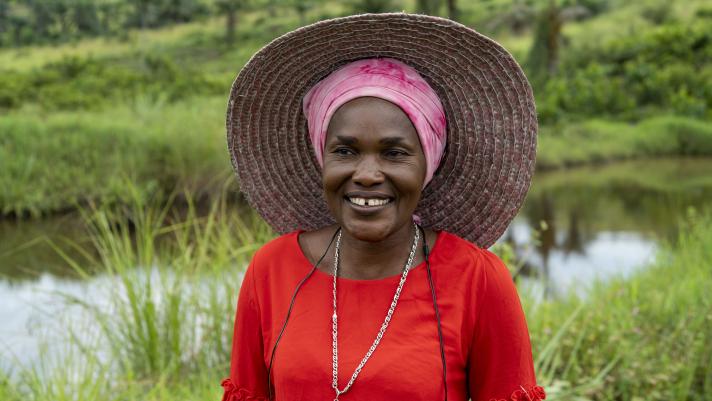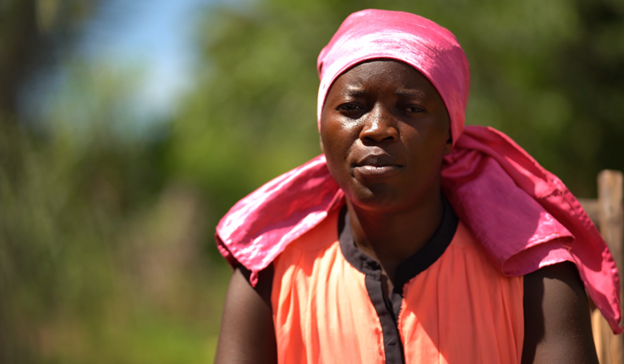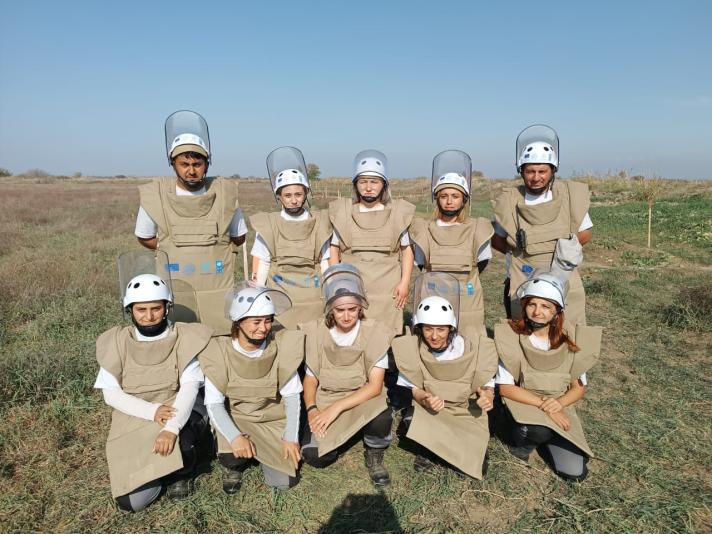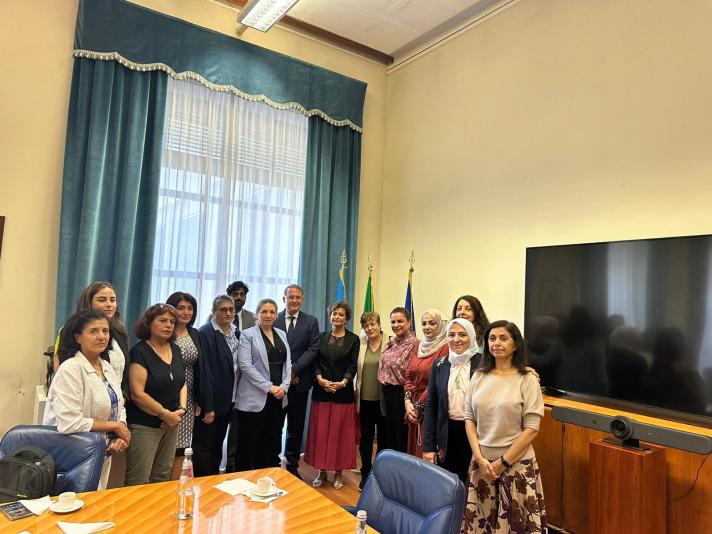On this International Women’s Day, we are proud to highlight three remarkable projects that underline the European Union’s (EU) commitment to empowering women. These initiatives deal with addressing the complex issues of conflict-related sexual violence in the Democratic Republic of the Congo (DRC), mine-clearance operations in Azerbaijan, and women's engagement in the peace-building process in Syria.
Engaging survivors as crucial stakeholders
In 2020, the Global Survivor’s Fund (GSF), in collaboration with the Panzi Foundation DRC and the National Movement of Survivors of Sexual Violence, embarked on a ground-breaking project in the Democratic Republic of the Congo to provide interim reparative measures for survivors of conflict-related sexual violence.
The DRC, marred by armed conflicts since the 1990s, had seen between 250,000 and 1 million women subjected to conflict-related sexual violence. While few have received medical care or psychological support, none of them have received any form of reparation – a right enshrined in international law for the victims of gross human rights violations.
With FPI’s support, the GSF, working closely with its partners, developed an interim reparative measure project spanning the country’s North Kivu, South Kivu, and Kasaï-Central regions. The survivors, key participants in the effort, co-created the project from the start. They helped identify and jointly create solutions for both individual and collective healing measures. These included compensations, along with financial management training, vocational training, job coaching, medical care, psychological support, and the establishment of four survivor community centres
Survivors like Adel-Rose Tsibey from Mulombodi in the Kasaï-Central region, shared her harrowing experience during the conflict in 2016. She vividly recalled the soldiers entering her house, subjecting her to sexual violence in front of her seven children. She struggled with despair and illness until the GSF project offered her mental health support, medical care, and temporary relief. Adel-Rose is now an advocate, emphasising the transformative power of the project: "Thanks to this project, I now have activities that enable me to look after my family. I feel very useful in society, and I'd like to become a Member of the Provincial Parliament."
Georgette Mukuna from Kananga, also in the Kasaï-Central region, echoed Adel-Rose's sentiments. She spoke about the horrors of war in 2016, including rape and torture, to which both she and her husband Martin were subjected. The GSF project, through its psychological support and vocational training, helped them rebuild their lives. “I have learnt several skills and I'm proud of it, because the sum of money would have run out, but what I've learnt is going to help me and my whole family,” Georgette says.
The project is having a profound and transformative impact on the lives of survivors in the region. An impact evaluation carried out by the Netherlands Institute for the Study of Crime and Law Enforcement found that 98% of survivors felt that the project had changed their lives, and the percentage of survivors feeling excluded from their communities decreased by 64 percentage points thanks to the project. “Today, I am no longer a victim, I am a survivor. I have the strength to claim my right to reparations,” said Tatiana Mukanire, a survivor and advocate from DRC.
Advocacy and technical support are an important aspect of the GSF intervention in the DRC, as the project supports national authorities in developing a survivor-centred reparation policy and fund. Since 2023, GSF has been boosting both the technical skills and advocacy abilities of survivor groups and civil society organisations, so that they are equipped to carry on the survivor-centric approach into all future initiatives. This effort aims to ensure they are well-prepared to actively participate in the reparation process.
Empowering women deminers in Azerbaijan
Addressing the long-standing Nagorno-Karabakh conflict, another FPI-funded project focuses on mine action in Azerbaijan. The initiative, implemented by Mines Advisory Group (MAG) in partnership with the United Nations Development Programme (UNDP) and the International Eurasia Press Fund, seeks to improve the protection of civilians through confidence-building measures.
The project, launched on 16 June 2023 in Tartar, Azerbaijan, aims to address contamination with mines and unexploded ordnance in Azerbaijan efficiently and in compliance with International Mine Action Standards (IMAS). At the same time, it aims at increasing women's involvement in mine-clearance operations.
With this in mind, in March 2023, MAG announced job openings specifically for women deminers, marking a significant step towards gender equality in a traditionally male-dominated field. The International Eurasia Press Fund (IEPF) played a crucial role in raising awareness about the project and conducting informative sessions in communities.
The project received high number of applications and successfully formed two all-female demining teams. Its strong commitment to creating a safe working environment for women in mine-clearance operations is reflected in testimonials from the field. Aytan Ismayilova, a female deminer, shared her journey: "When I first heard about this project, I didn’t believe it. I applied to become a deminer, but my mother was afraid. Now she is very proud of me."
Another female deminer, Maral Mammadova, said that the work she is doing gives her a sense of pride. “This is a glorious work and I am proud of doing it. I am thankful to the European Union for this opportunity, the first one in Azerbaijan,” she said.
Shahin Allahverdiyev, Operational Manager of the International Eurasia Press Fund’s Community Mine Action project, acknowledged the significance of employing women as deminers. “I am happy we are employing women as deminers, we need them. This is a good employment opportunity, and it gives us the chance to speak about gender equality in mine action. I hope more women will become deminers,” he said.
Women leading peacebuilding efforts
In Syria, the UN Women Syria programme, supported by the FPI, focuses on ensuring active involvement of women in building a sustainable peace in the country. This broad effort covers many important areas: it backs political activities, works with global partners, carries out studies, and supports civil society organisations.
The overarching goal is to enable Syrian women to participate meaningfully in an inclusive peace process. This involves supporting the Women's Advisory Board (WAB) to facilitate women's rights discussions within the political process, coordinating with international actors, conducting research and gender analysis, and supporting civil society organisations.
The support from the EU has resulted in substantial progress in the political process. Between 2020 and 2023, the programme facilitated numerous meetings for the WAB, organised thematic roundtables, and strengthened coordination with Syrian civil society partners. The impact is evident in the increased knowledge, advocacy skills, and legitimacy of the WAB in the political process.
Additionally, the programme has published seven knowledge products, addressing the limited availability of accessible knowledge on the gender dynamics of the Syrian conflict. This includes gender analysis of the impact of the 2023 earthquake and a study on women's role in local mediation in Syria.
The Syria Programme has played a crucial role in increasing access to financial and technical resources for 120 women leaders across 64 local women's civil society organisations. This support has a multiplying impact, helping over 2,000 women in civil society groups gain additional training.




